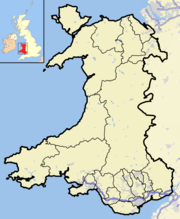Portal:Wales/Intro


Wales (Welsh: Cymru, pronounced [ˈkəmrɨ] ) is a country that is part of the United Kingdom, bordered by England to its east and the Atlantic Ocean and Irish Sea to its west. It has a population of three million, and a total area of 20,779 km2 (8,023 sq mi). Wales has over 2,700 km (1,700 mi) of coastline and is largely mountainous, with its highest peaks in the north and central areas, including Snowdon (Yr Wyddfa), its highest summit. The country lies within the north temperate zone and has a changeable, maritime climate.
Wales was an agricultural society for most of its early history, the country's terrain meaning that pastoral farming was the primary source of its wealth. In the 18th century, the introduction of the slate and metallurgical industries at the dawn of the Industrial Revolution began to transform the country into an industrial nation. The exploitation of the South Wales coalfield in the Victorian era caused a rapid expansion of the Welsh population. Two-thirds of Wales' inhabitants now live in South Wales, mainly in and around the capital city, Cardiff (Caerdydd), in the cities of Swansea (Abertawe) and Newport (Casnewydd), and in the nearby valleys. Today, with the country's traditional heavy industries either gone or in decline, Wales' economy depends on the public sector, light and service industries, and tourism.
From the late 19th century onwards, Wales acquired its popular image as the "land of song", attributable in part to the revival of the eisteddfod tradition. Although football has traditionally been the more popular sport in North Wales, rugby union is seen as a symbol of Welsh identity and an expression of national consciousness. Wales is officially bilingual, with the Welsh and English languages having equal status. The Welsh language is an important element of Welsh culture, and is spoken by over 580,000 people, more than 20% of the population. Following annexation by England in the 16th century, English law has been the legal system of Wales and England; the National Assembly for Wales, created in 1999 following a referendum, holds responsibility for a range of devolved policy matters.
